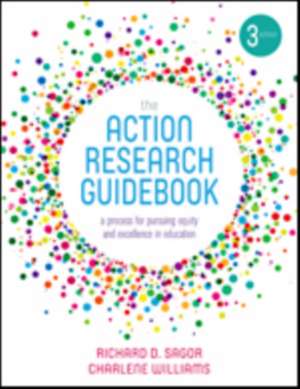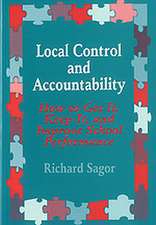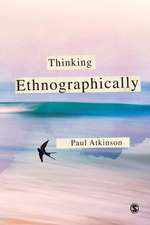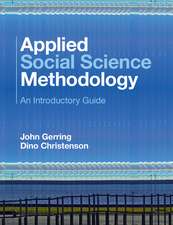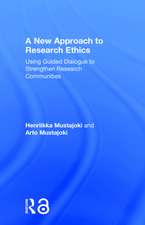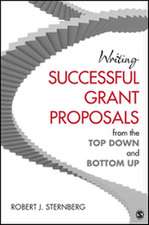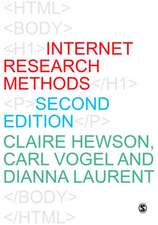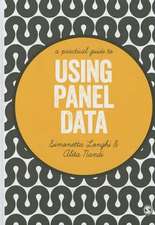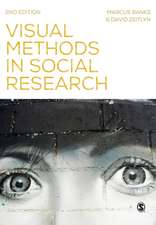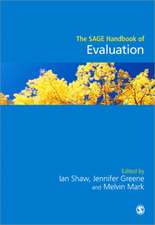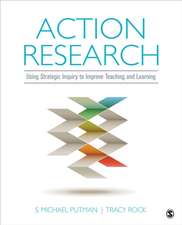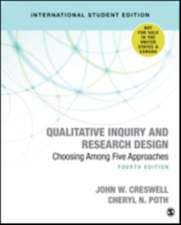The Action Research Guidebook: A Process for Pursuing Equity and Excellence in Education
Autor Richard D. Sagor, Charlene Denise Verreen Williamsen Limba Engleză Paperback – 5 feb 2017
Preț: 228.70 lei
Nou
43.76€ • 45.81$ • 36.21£
Carte disponibilă
Livrare economică 17-31 martie
Specificații
ISBN-10: 1506350151
Pagini: 288
Dimensiuni: 216 x 279 x 20 mm
Greutate: 0.77 kg
Ediția:Third Edition
Editura: SAGE Publications
Colecția Corwin
Locul publicării:Thousand Oaks, United States
Recenzii
"The most successful educators are those that purposefully reflect on their practices, with a focus on how and to what degree these practices impact student learning. This book provides a four-stage structured approach for teachers and administrators to engage in action research, with the ultimate goal being to move our schools and classrooms closer to universal student success.”
Cuprins
Publisher’s Acknowledgments
About the Authors
1. Introduction to Action Research
Why Conduct Action Research?
The Complexity of Routine Instructional Decisions
Key Terms and Concepts
Universal Student Success
2. Finding a Focus
Zeroing in on Your Priorities
Using Reflective Writing to Find a Focus
Performance, Process, and Program Targets and Action Research by School Leaders
Using a Journal to Identify Action Research Foci
Reflective Interviews
Reflective Interviewing and the Problem of Isolation
Analytic Discourse
Team Reflection
3. Refining the Focus
Visualizing Success
Conducting an Instructional Postmortem
Taking Stock of One’s Recent Leadership Experience
Comparing Your Experience With the Experience of Others
Developing Criteria to Measure Changes With Priority Achievement Targets
Creating Performance Rating Scales
Rating Scales and Program Action Research
The Special Problem of Long-Range Goals
Assessing Rate of Growth
Determining Adequate Yearly Progress in Real Time
Producing Your Own Rate-of-Growth Charts
Ascertaining Rate of Growth in Leadership Projects
4. Articulating a Theory of Action
If Not Us, Who?
An Adequate Knowledge Base Already Exists
Going Beyond Proven Practices: Building a Theory of Action
Two Kinds of Variables
Creating Mileposts on the Route to Mastery
Inferring Independent Variables
Using the Priority Pie to Identify, Clarify, and Weigh Independent Variables
Using the Priority Pie With Descriptive Research
5. Drawing a Theory of Action
Why a Map?
European Explorers as Action Researchers
Building a Graphic Reconstruction
Graphic Reconstructions for Quasi-Experimental Research
Graphic Reconstructions With Descriptive Research
Proofing a Theory of Action for Leadership Projects
6. Determining the Research Questions
Three Generic Action Research Questions
Developing Your Own Research Questions
Two-Step Walk-Through
Drafting the Questions
Surfacing Research Questions for Leadership Projects
7. Building a Data Collection Plan
Data Collection and the Competing Demands for Your Time
What Qualifies as Teaching?
What Things Qualify as Data?
Data in Descriptive Research
Data in Quasi-Experimental Research
Data Collection and Concerns About Precision
Fishing in a Sea of Data
Securing Research Assistants
Building a Triangulated Data Collection Plan
Data Collection Planning for Leadership Projects
Integrating Efficiencies Into Your Data Collection Work
Using Technology to Compile and Assemble Action Research Data
Keeping a Researcher’s Journal
8. Analyzing the Data
Trend Analysis
Organizing Data to Help Answer the Three Generic Questions
ACR Question 1: What Did We Do?
ACR Question 2: What Changes Occurred Regarding the Achievement Targets?
ACR Question 3: What Was the Relationship Between Actions Taken and Any Changes in Performance on the Targets?
Drawing Tentative Assertions
Using Member Checking to Add Credibility to the Tentative Assertions
Additional Tools for Qualitative Data Analysis
Qualitative Data Analysis Using Bins and a Matrix
Low-Tech Strategies for Bins and Matrixes
Using a Computer for Bins and Matrixes
9. Turning Findings Into Action Plans
Modifying Your Theory of Action
Data-Based Decision Making
Turning Your Findings Into Ed Specs
Solicit and Brainstorm Action Alternatives
Using Ed Specs to Evaluate Action Alternatives
Using Ed Specs to Evaluate Action Alternatives for Schoolwide Projects
Completing the Cycle: Revised Theory of Action 2
10. Reporting and Sharing Action Research
Common Issues
Formats for Reporting
Creating a Bank of Abstracts
Creating a District Archive
11. Conclusion: The School as a Learning Organization
The Two Keys: Coherence and Congruence
Putting the Pieces Together
Resources
Resource A: How to Use the Feedback Forms and Summary Reports
Resource B: Five Characteristics of a Quality Action Research Project
Resource C: Applications for Leadership Projects
Resource D: Sample Abbreviated Action Research Reports
Glossary
References
Index
Notă biografică
Richard Sagor recently retired from his position as professor and director of the Educational Leadership Program at Lewis & Clark College. In 1997 he founded ISIE (pronounced ¿I see¿), the Institute for the Study of Inquiry in Education, to work with schools and educational organizations on the use of action research and data-based school improvement while he was a professor of educational leadership at Washington State University (WSU).
Prior to his work at the university level, Sagor had 14 years of public school administrative experience, including service as an assistant superintendent, high school principal, instruction vice principal, disciplinary vice principal, and alternative school head teacher. He has taught the entire range of students, from the gifted to the learning disabled, in the areas of social studies, reading, and written composition.
Educated in the public schools of New York, Sagor received his BA from New York University and two MA degrees as well as a PhD in Curriculum and Instruction from the University of Oregon.
Beyond his work as a teacher and administrator, Sagor has had extensive international consulting experience. He served as a site visitor for the United States Department of Education¿s Secondary School Recognition Program and has worked with the Department of Defense¿s overseas schools, numerous state departments of education, and over 200 separate school districts across North America. His consulting has focused primarily on leadership development, the use of data with standards-based school improvement, collaborative action research, teacher motivation, and teaching at-risk youth.
His articles on school reform and action research have received awards from the National Association of Secondary School Principals and the Educational Press Association of America. Sagor¿s books include The TQE Principal: A Transformed Leader; At-Risk Students: Reaching and Teaching Them; How To Conduct Collaborative Action Research; Local Control and Accountability: How to Get It, Keep It, and Improve School Performance; Guiding School Improvement With Action Research; Motivating Students and Teachers in an Era of Standards; and Collaborative Action Research for Professional Learning Communities.
Sagor can be contacted at the Institute for the Study of Inquiry in Education, 16420 SE McGillivray, Suite 103¿239, Vancouver, WA 98683, or by e-mail at rdsagor@isie.org.
